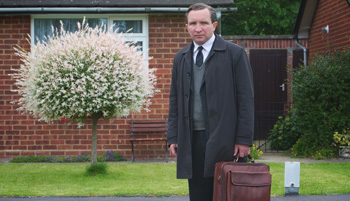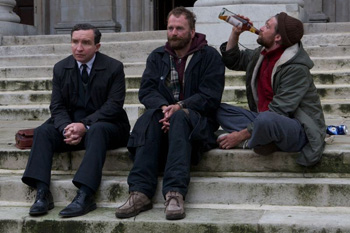For Sunday March 5, 2017
First Sunday in Lent
Lectionary Readings (Revised Common Lectionary, Year A)
Genesis 2:15–17; 3:1–7
Psalm 32
Romans 5:12–19
Matthew 4:1–11
Back in December, a JwJ reader emailed me with a movie suggestion. Frank said that he thought I would like the British film "Still Life" (2013). It's still available on Amazon Streaming, and I highly recommend it. After the credits rolled, I thought to myself, "Come March, I have the perfect film to present at our church's Lenten faith and film series."
Uberto Pasolini wrote and directed this poignant story about a low level functionary in the British bureaucracy of South London. John May is a case worker whose job is to find the next of kin for people who have died alone. And finding the next of kin for people who have died lonely and alone turns out to be quite a challenge.
"That's a strange job you've got, all those people," says one person, to which May responds, "I love my work." And he does. He conducts his bureaucratic responsibilities with an obsessive-compulsive dedication to detail and, more important, an authentic sense of the dignity of every human life — and death, no matter how obscure or alone.
Most surviving family members "refuse assistance," as May's bureaucratic form puts it. They want nothing to do with their dead relative when May calls them. No, they don't want any of the personal effects that May lovingly collected from their apartment. No, they won't attend the funeral. No, they won't help to pay for the burial, and no, there's no one else to call.
So, when those who died lonely and alone are abandoned even after death, May organizes their funerals. He writes their eulogies based upon what he can discover about them, attends their burials, and then spreads their ashes. He's the only person present in these sacred moments except for the lone priest or the grave diggers.
May himself is socially isolated. He lives alone, and for supper plops a tin of tuna onto a plate. But then, in an incredibly powerful scene, after dinner he pulls out a scrapbook of photos that he's made of those on whom he's bestowed such dignity — a family portrait, a driver's license, a worker ID card, or perhaps a newspaper clipping. Slowly and tenderly he contemplates the lives lived that are now gone. It takes your breath away.
 |
|
Case worker John May in "Still Life."
|
This being a bureaucracy, May's job is "amalgamated," as his boss put it, and so he's soon to be out of work — but not before he begs to finish one last case pertaining to Billy Stoke. Billy was the quintessential loner and alcoholic. In fact, he lived in the apartment across from May, even though he never met the man. As he did with so many others, May stitches together Billy's lost story, reconnects his estranged daughter and friends, and plans his funeral. But then, both romance and tragedy strike.
I won't spoil the movie, but the last moments of this story that take place in a cemetery are some of the most powerful images that I've ever seen in any movie.
At my church this Ash Wednesday, the priest will smear ashes on my forehead to remind me of my mortality. As he does so, he'll recite God's words to Adam in Genesis 3:19, “for dust you are, and to dust you will return.” This somber truth stands in stark contrast to the archetypal lie that Satan told Eve in Genesis 3:4, and the denial that flourishes down to our own day: "surely you will not die!"
In the Bible, forty is a number of sacred significance. The Genesis flood lasted forty days and forty nights. Israel wandered in the wilderness for forty years. In the reading for last week, Moses spent forty days and nights on Mt. Sinai. Jonah preached to Nineveh for forty days. And in the gospel this week, Jesus spent forty days in the desert fasting, praying, and battling the devil.
And so, since the fourth century, Christians have set aside the forty week days before Easter as a time for repentance, reflection and self-examination. We consider the Lenten wisdom to "remember death" — memento mori. We remember death in order to affirm life. Meditating on mortality helps me to live more fully in the present.
At Lent this year I'm reminded of a favorite poem by Jane Kenyon called "Otherwise."
I got out of bed
on two strong legs.
It might have been
otherwise. I ate
cereal, sweet
milk, ripe, flawless
peach. It might
have been otherwise.
I took the dog uphill
to the birch wood.
All morning I did
the work I love.At noon I lay down
with my mate. It might
have been otherwise.
We ate dinner together
at a table with silver
candlesticks. It might
have been otherwise.
I slept in a bed
in a room with paintings
on the walls, and
planned another day
just like this day.
But one day, I know,
it will be otherwise.
This spare poem begins with gratitude for the simplest gifts of everyday life — food, work, sleep, marriage, and even the family dog. It ends with an abrupt confession that these joys won't last forever. Indeed, Kenyon herself died of leukemia at the age of forty-seven.
 |
|
John May with Billy Stoke's friends.
|
I love Lent. It reminds me that I don't need to be stuck in old ways of thinking and acting. Renewal is possible. I can wipe the mud off my glasses. Hit the reset button. I don't need to wait for old age to magically impart a new perspective on what matters most and why.
In a culture that glorifies excess and indulgence, hubris and bravado, Wednesday's ashes signify an outrageously counter-cultural act of humility. Lent is the most brutally realistic liturgical season of the year — it's a time when we tell the truth about ourselves, our brokenness, our mortality, and nevertheless trust in God's redemptive love.
I love the German title for the film "Still Life." It's called "Mr. May und das Flüstern der Ewigkeit." That is, "Mr. May and the Whisper of Eternity." That's exactly what Lent offers us when we listen to the stories all around us about the goodness of life and the certainty of death — whispers of eternity.
Image credits: (1) Salty Popcorn and (2) DC Filmdom.





